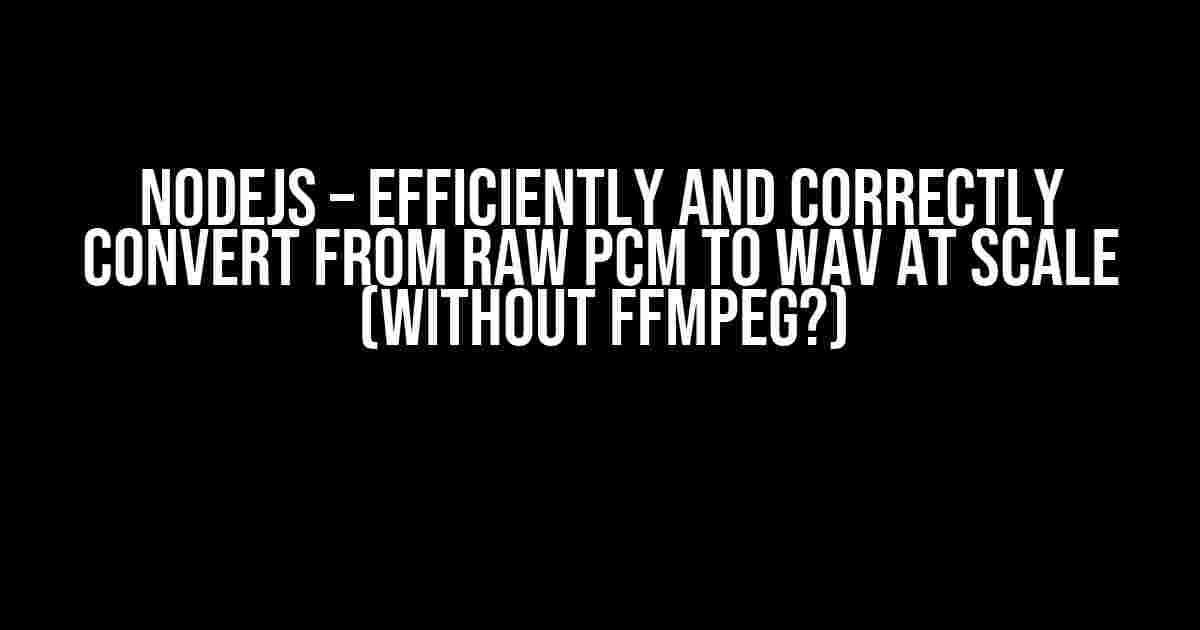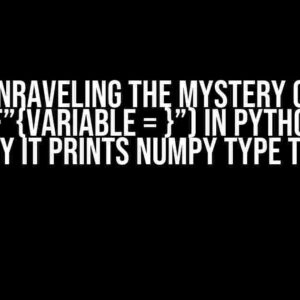As a developer, working with audio files can be a daunting task, especially when it comes to converting raw PCM data to WAV format. FFMPEG is often the go-to solution, but what if you want to avoid using it? Fear not, dear developer! In this article, we’ll explore how to efficiently and correctly convert raw PCM to WAV at scale using NodeJS, without relying on FFMPEG.
What is PCM and WAV?
Before we dive into the conversion process, let’s quickly cover the basics. PCM (Pulse Code Modulation) is an uncompressed digital representation of an audio signal. It’s the raw, unprocessed data that comes straight from the audio source. WAV (Waveform Audio File Format), on the other hand, is a compressed audio file format that’s widely supported by most devices and software.
Why Convert from PCM to WAV?
Converting PCM to WAV is essential for several reasons:
- Storage efficiency: WAV files are significantly smaller than raw PCM data, making them more suitable for storage and transmission.
- Compatibility: WAV is a widely supported format, ensuring that your audio files can be played back on most devices and software.
- Quality preservation: Converting PCM to WAV helps preserve the original audio quality, ensuring that your audio files sound great.
The Conversion Process
Now that we’ve covered the basics, let’s get started with the conversion process. We’ll use NodeJS to create a script that efficiently converts raw PCM data to WAV format.
Step 1: Install Required Dependencies
Before we begin, make sure you have the following dependencies installed:
node-pcm: A NodeJS module for working with PCM data.wav: A lightweight WAV file writer for NodeJS.
Run the following commands in your terminal:
npm install node-pcm npm install wav
Step 2: Read the PCM Data
Create a new JavaScript file (e.g., pcm-to-wav.js) and require the node-pcm module:
const PCM = require('node-pcm');
Next, read the raw PCM data from a file or buffer. For this example, we’ll assume you have a PCM file named audio.pcm:
const pcmData = fs.readFileSync('audio.pcm');
Step 3: Convert PCM to WAV
Create a new WAV file writer using the wav module:
const WAV = require('wav');
const writer = new WAV.Writer({
channels: 2, // Stereo audio
bitDepth: 16, // 16-bit PCM
sampleRate: 44100 // 44.1 kHz sample rate
});
Now, let’s convert the PCM data to WAV format. We’ll use the PCM.decode() method to decode the raw PCM data, and then write it to the WAV file:
const pcmBuffer = Buffer.from(pcmData);
const wavBuffer = PCM.decode(pcmBuffer, {
channels: 2,
bitDepth: 16,
sampleRate: 44100
});
writer.write(wavBuffer);
Step 4: Write the WAV File
Finally, write the WAV file to disk:
writer.pipe(fs.createWriteStream('output.wav'));
Putting it all Together
Here’s the complete pcm-to-wav.js script:
const fs = require('fs');
const PCM = require('node-pcm');
const WAV = require('wav');
const pcmData = fs.readFileSync('audio.pcm');
const writer = new WAV.Writer({
channels: 2,
bitDepth: 16,
sampleRate: 44100
});
const pcmBuffer = Buffer.from(pcmData);
const wavBuffer = PCM.decode(pcmBuffer, {
channels: 2,
bitDepth: 16,
sampleRate: 44100
});
writer.write(wavBuffer);
writer.pipe(fs.createWriteStream('output.wav'));
Optimizations for Scale
When working with large audio files or high-traffic applications, it’s essential to optimize your conversion process for scale. Here are some tips to help you achieve efficient conversion at scale:
- Batch processing: Convert multiple PCM files in batches to reduce the number of writes and improves overall performance.
- Stream processing: Use NodeJS streams to process PCM data in real-time, reducing memory usage and improving responsiveness.
- Parallel processing: Utilize multiple CPU cores to process PCM data in parallel, significantly reducing conversion time.
- Caching: Implement caching mechanisms to store converted WAV files, reducing the need for repeated conversions and improving overall performance.
Conclusion
Converting raw PCM data to WAV format at scale without FFMPEG is a challenging task, but with NodeJS, it’s definitely possible. By following the steps outlined in this article, you can efficiently and correctly convert PCM to WAV, ensuring that your audio files are stored and transmitted efficiently. Remember to optimize your conversion process for scale using batch processing, stream processing, parallel processing, and caching.
Happy coding, and don’t forget to share your own NodeJS adventures with the world!
| Dependency | Version |
|---|---|
| node-pcm | 1.4.1 |
| wav | 1.3.1 |
Frequently Asked Question
Get the answers to your burning questions about efficiently and correctly converting from raw PCM to WAV at scale without FFMPEG in NodeJS!
Q: Can we use the wav package in NodeJS to convert raw PCM to WAV?
A: Yes, we can! The wav package is a popular and lightweight NodeJS module that allows us to create and manipulate WAV files. It can efficiently convert raw PCM data to WAV format, making it a great alternative to FFMPEG. Just install it using npm (npm install wav) and start converting!
Q: What’s the fastest way to convert raw PCM to WAV in NodeJS?
A: The fastest way to convert raw PCM to WAV in NodeJS is by using a combination of the Buffer class and the wav package. You can create a Buffer object from the raw PCM data and then use the wav package’s write function to create a new WAV file. This approach allows for efficient and fast conversion, making it perfect for large-scale applications!
Q: How do I handle large files and scalability issues when converting raw PCM to WAV in NodeJS?
A: To handle large files and scalability issues, use a streaming approach! You can create a readable stream from the raw PCM data and pipe it to a writable stream that creates the WAV file using the wav package. This approach allows for efficient handling of large files and prevents memory issues, making it perfect for scalable applications!
Q: Are there any specific considerations I should keep in mind when converting raw PCM to WAV in NodeJS?
A: Yes, there are a few specific considerations to keep in mind! Make sure to correctly set the sample rate, bit depth, and number of channels in the WAV header to ensure compatibility with different audio players and systems. Additionally, be mindful of the byte order and data type of the raw PCM data, as these can affect the conversion process!
Q: Can I use NodeJS to convert raw PCM to other audio formats, such as MP3 or FLAC?
A: While NodeJS can be used to convert raw PCM to WAV, it’s not as straightforward to convert to other formats like MP3 or FLAC without FFMPEG. However, you can use NodeJS modules like lame or flacc to convert WAV files to MP3 or FLAC, respectively. Alternatively, you can use a cloud-based audio processing service that supports multiple formats!



